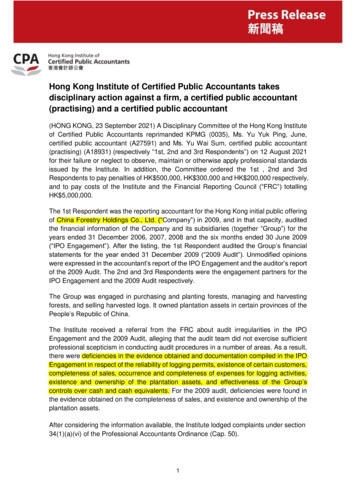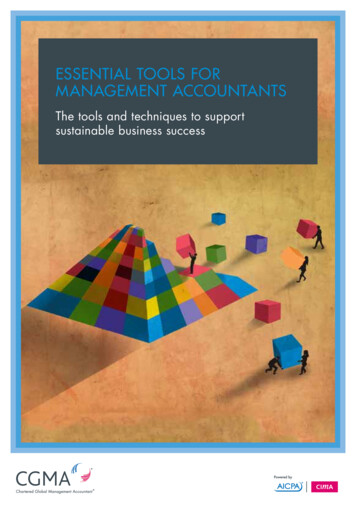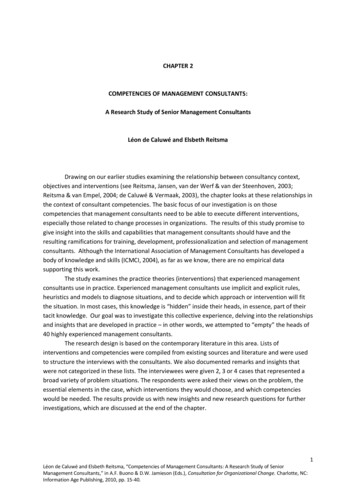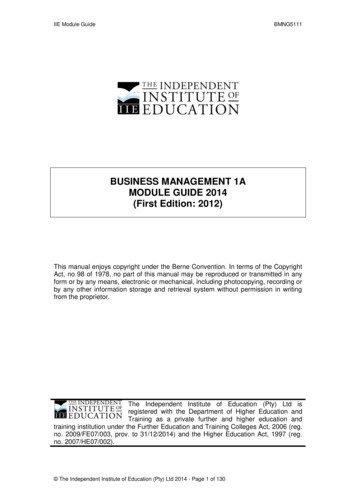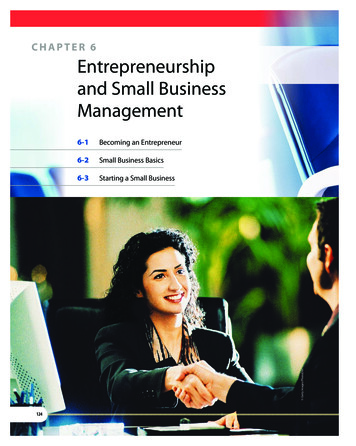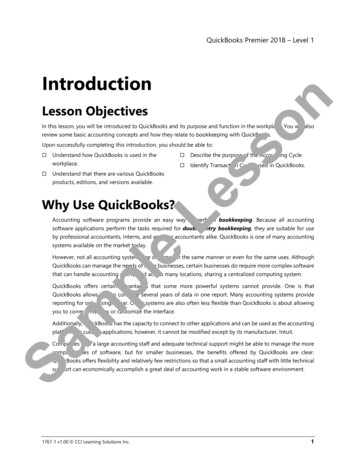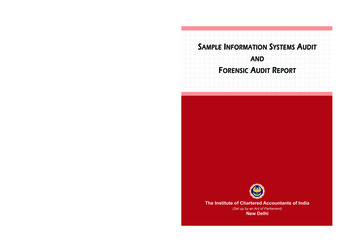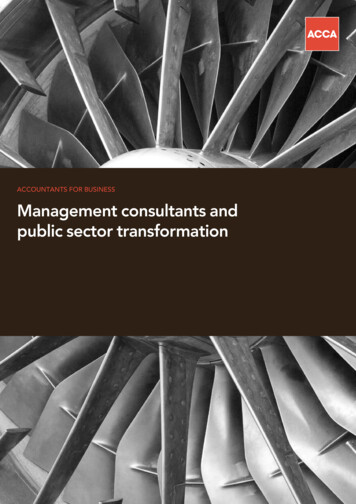
Transcription
Accountants for businessManagement consultants andpublic sector transformation
About ACCAACCA (the Association of Chartered CertifiedAccountants) is the global body for professionalaccountants. We aim to offer business-relevant,first-choice qualifications to people of application,ability and ambition around the world who seek arewarding career in accountancy, finance andmanagement.Founded in 1904, ACCA has consistently held uniquecore values: opportunity, diversity, innovation, integrityand accountability. We believe that accountants bringvalue to economies at all stages of their development.We seek to develop capacity in the profession andencourage the adoption of global standards. Ourvalues are aligned to the needs of employers in allsectors and we ensure that, through our qualifications,we prepare accountants for business. We seek to openup the profession to people of all backgrounds andremove artificial barriers, innovating our qualificationsand their delivery to meet the diverse needs of traineeprofessionals and their employers.We support our 140,000 members and 404,000students in 170 countries, helping them to developsuccessful careers in accounting and business, basedon the skills required by employers. We work through anetwork of 83 offices and centres and more than8,000 Approved Employers worldwide, who providehigh standards of employee learning and development.Through our public interest remit, we promoteappropriate regulation of accounting and conductrelevant research to ensure accountancy continues togrow in reputation and influence.About Accountants for businessACCA’s global programme, Accountants for Business,champions the role of finance professionals in allsectors as true value creators in organisations.Through people, process and professionalism,accountants are central to great performance. Theyshape business strategy through a deep understandingof financial drivers and seek opportunities for longterm success. By focusing on the critical roleprofessional accountants play in economies at allstages of development around the world, and indiverse organisations, ACCA seeks to highlight andenhance the role the accountancy profession plays insupporting a healthy global economy.www.accaglobal.com/accountants business The Association of Chartered Certified Accountants,20102This paper outlines the costs,roles and impacts ofmanagement consultants withinthe public sector, and examinesthe evidence about how effectivemanagement consultants are atadding value to the organisationswith which they work.
1. IntroductionManagement consultancy within the public sectorcontinues to attract public scrutiny, and rightly so becauseof the financial climate and the need for public services tooperate efficiently. In 2009 central government alone spent 1.5 billion on management consultants.1The degree to which they add value may be debated, but itis widely accepted that their knowledge, experience andskills can potentially add value across three areas to theorganisations with which they work.Management consultants may: provide knowledge that helps clients take betterdecisions bring experience in project management that helpsclients to execute their plans more effectively bring skills to help improve the capability andteamwork of managers.This report examines the evidence on how effectivemanagement consultants are at adding value within thepublic sector.It investigates the cost of consultancy in the public sectorand considers how consultancy should be defined; forexample, contracting out and interim management areoften confused with consultancy.The paper also considers how clients employ and usemanagement consultants, the resulting relationships, andwhether this has any impact on project outcomes andachieving the desired added value. It can often be the casethat management consultants are to blame when things gowrong. Equally, the client can sometimes find it easy todeflect responsibility for making tough decisions to theconsultant – ‘the consultant told us that this is how it shouldbe’.1. http://www.ogc.gov.uk/procurement public ANSFORMATION1. INTRODUCTION3
2. The cost of management consultancyIt seems that every day management consultants areberated in the press: ‘Health trusts spend 300 million onprivate management consultants NHS figures show“wasteful” consultancy bill could pay for cancer treatmentsand fund 10,000 nurses’. 2 On the other hand, the publicsector is criticised for poor productivity: ‘Poor productivityin the workforce is the main reason why the productivity ofthe whole public sector has fallen over the last ten years’, 3so arguably this sometimes requires outside private sectorexpertise to improve.Current government policy is to reduce the cost of publicservices while continuing to improve outcomes and valuefor money. It has promised a crackdown on the use ofmanagement consultants as part of a savings drive. Thiswill mean that now, more than ever, the focus will be onwhether management consultants deliver added value.Currently, central government spends an estimated 1.5billion on the hiring of management consultants.4Government policy will seek to curb high-spendingdepartments such as those identified by the Efficiency andReform Group of the Cabinet Office (formerly the Office forGovernment Commerce (OGC)) including the Ministry ofDefence ( 204m expenditure on consultants), Departmentfor Transport ( 144m), and the Department for Children,Schools and Families ( 70m).5With this government, as with previous governments, whenthe point is reached at which they have to cut spending,management consultants are the first to go becausespending on them is discretionary. In practice, thedownsizing of some central government departments isnot compatible with a continued need to implement newpolicy, develop new initiatives, and be seen to be doingnew things. The irony is that government departments willneed to demonstrate that they are responding to newministerial requirements, so they will have to purchasecapable resources in order to fulfil these.2. usts-privatemanagement consultants3. %20Sector%20Productivity%20v2.pdf4. http://www.ogc.gov.uk/procurement public spending.asp5. et-2010-cutsconsultants-pr4The OGC, now in the Efficiency and Reform Group of theCabinet Office, collected spending data for 2007/08 aspart of its ‘Consultancy Value Programme’ (OGC wasestablished in 2006, following a review of the use ofmanagement consultants in the public services, to ensurethat better value for money was achieved by centralgovernment departments). Table 2.1 shows that over aperiod of three years there has been a 31% total decreasein spending on management consultants.At first glance, the ‘Consultancy Value Programme’appears to have been instrumental in achieving greatervalue from the use of management consultants, andorganisations such as the Management ConsultanciesAssociation (MSC) are keen to refer to it to highlight theirvalue. Further analysis of one central governmentdepartment, the Department of Communities and LocalGovernment (CLG), which on its website has made publicall payments to suppliers in excess of 500, revealed thata total of 73 million (Table 2.2) was spent on consultancyservices in 2009/10 compared with 35 million (Table 2.1)in 2007/08. Hence, department expenditure had doubledand not decreased.
Table 2.1: 2007/08 spending on management consultantsby the 16 highest-spending departments6NAO 2005/06( m)2007/08( 6133%Total1,350773-43%Calculation for totalcentral government(using NAOmethodology)1,583909–43%Calculation for totalcentral government,excl. DFID(using CHMT6. http://www.ogc.gov.uk/professional services consultancy CTORTRANSFORMATIONTable 2.2: CLG spending on management consultants2009/107Nature of consultancy 000sStrategic consultancy27,709External research31,218Property services consultancyMarketing and communications consultancy2,844354Legal services consultancy4,893IT consultancy4,669HR consultancy110Finance consultancy868Total72,665No doubt further analysis of the invoices may revealreductions in CLG’s total spending on managementconsultants, as these amounts may include elements ofinterim management, contracting out of services, etc. Also,there may be some debate on whether external researchshould be included as a cost for consultancy services.Arguably, if external research includes evaluations oforganisational performance and contributes to theformulation of polices and management decisions itshould be considered as management consultancy.Nonetheless, if we take the cost of external research out ofthe CLG’s total expenditure on management consultancy(Table 2.2) it would still be greater than the figurepresented in Table 2.1 for 2007/08.As shown, a key problem with the figures is that we do notreally know how much is spent on managementconsultancy in central government or the public sectormore widely. In part this is because of uncertainty aboutwhat should and should not be included under the heading‘management consultancy’. It likely that the 1.5 billionquoted is an under- rather than an overestimate. TheCOINS data system (the Combined Online Informationsystem) does not help in identifying the cost ofconsultancy as it does not categorise expenditure insufficient detail.7. xls/1687998.xls2. THE COST OF MANAGEMENT CONSULTANCY5
3. What is and what is not management consultancy?Few organisations in the public sector will have avoidedrecruiting management consultants, at some point duringtheir lifecycle, in order to find new ways of working and toimprove performance. The menu of programmes isextensive, stretching from organisational development,‘lean thinking’, process re-engineering to achieve businessexcellence, project management, total quality, etc.Arguably, these programmes have had an impact on theefficiency and effectiveness of public services, althoughthis is not known for certain as the evaluation ofconsultancy programmes has not been undertaken on asystematic basis. A Parliamentary report on the use ofmanagement consultants by the NHS and the Departmentof Health revealed mixed results.8There is a considerable literature on consultancy, mainlybecause of its economic impact. Its origins can be tracedback to the turn of the century and programmes inefficiency and time and motion studies introduced byCharles Bedaux, Lillian Gilbreth and Frederick Taylor.9Management consultancy was historically a private sectorphenomenon concerned with industrial production. In the1980s and 1990s it was one of the fastest-growing sectorsin advanced economies, with expansion across bothprivate and public sectors. Clark and Fincham10 argue thatincreased demand for consultancy was a result ofincreasing international competition, technologicalchanges, recessionary forces and changes in managementrequirements and that these factors led management tobelieve that new skills, values and qualities were lacking inorganisations. The old structures, cultures and ways ofworking were unsatisfactory at a time when organisationshad to make sometimes radical and fundamental changes.8. House of Commons Health Committee, The Use of ManagementConsultants by the NHS and Department of Health, fifth report of session2008/09.9. Timothy Clark and Robin Fincham, Critical Consulting: New Perspectiveson Management Advice, Blackwell, 2002.10. Ibid.6Consultancy is often referred to as work by those thatperform consultancy in the field of management. Its focusis on improving business practices and organisationalperformance. There are continuous debates about thescope of consultancy, particularly with the integration ofmanagement, business and information technology. Theedges are often blurred and misunderstood. For example,most recently, public concern over the use and cost ofmanagement consultants in public services has beenfuelled by the lack of understanding between what isunderstood as consultancy, interim management andcontracting out of services.This is because there has not been sufficient distinctionmade between the skills of the management consultantswho provide specialist skills that are not available internallyand those of contractors and interim managers who arethere purely to replace staff or deliver specific parts ofpublic services. In addition, information technology hasbecome critical to organisational performance andinformation strategies can now be considered to be withinthe domain of management consultants. While recognisingthe lack of distinct boundaries between the roles of thevarious parties, in this report we consider the use ofmanagement consultants in providing knowledge,experience and skills that help clients to improve, as wellas the key barriers to such improvement.
4. How management consultants are employed across the domainsin the public sectorThe National Audit Office (NAO) is quite specific about howit defines management consultancy – individuals orcompanies engaged to work on specific projects that areoutside the client’s usual remit, with a clear end-point fortheir involvement or for their responsibility for the finaloutcome of the project, eg cost savings or improvingquality of service largely rests with the client. As such,consulting is distinct from ‘outsourcing’ or ‘staffsubstitution’.A survey conducted by the Management ConsultanciesAssociation (MCA) in 2010 indicated that 72% ofmanagement consulting work carried out in centralgovernment is commissioned because relevant specialistskills were not available within the departments.11 One ofthe main reasons for using management consultants wasto deal with difficult situations or crises.In 2006 the NAO report states that:management consultants, when used correctly and in theappropriate circumstances, can provide great benefit toclients – achieving things that clients do not have thecapacity or capability to do themselves. On the otherhand, when used incorrectly, management consultantscan drain budgets very quickly, with little or no productiveresults’.12The report goes on to say that despite a spend of 2.8 billion on management consultants in 2005/06, ithas not been possible to make an overall assessment ofthe added value that has arisen from this expenditure. Inpart this is because departments have rarely collected anyinformation on what has been achieved.The MCA argued, on the basis of case studies, thatmanagement consultants add value across the three areasidentified in this report. For example:The NAO also identified instances when managementconsultants have added value, eg the Ministry of Defencewere able to make savings on procurement after usingmanagement consultants to help implement a newapproach and develop internal capabilities. Similarly,management consultants were important in building andcommunicating the assessment framework for capabilityreviews for the Cabinet Office.There are significant challenges in assessing the addedvalue from consulting projects. As the NAO pointed out, itcan be hard to identify useful measures that are suitablefor all types of projects, and attributing cause and effect isnot always easy, even where performance has improved.This has not stopped a plethora of toolkits developing tohelp managers make the best use of managementconsultants and assess their value, whether through peerreview or post-contract evaluations. Web-based toolkitssuch as those developed by the NAO13 and ‘ConsultancyValue Programme’14 have provided a structured andcoordinated way of managing government departments’use of management consultants.But how do management consultants themselves convinceclients that they can add value or know-how to a project,and what are the strategies they use? Much of the criticalresearch in this area has focused on whether or notmanagement consultancy sells itself as a profession. Anorganisational development specialist can for example,demonstrate worth by emphasising his or her knowledgeof behavioural sciences to solve an organisational problem.This would imply some professional status to the client. Onthe other hand, some claims may be more nebulous andmanagement consultants would have to work harder toconvince the client that they have a unique specialism orknowledge base. As a result, they will resort to referencesto results of previous work or claims to having core orunique products, in order to obtain the work.consultancy helps bring prison education and workregime together, making an impact on prisonerrehabilitation .Working with the Department of Work andPensions IT consultancy helps transforms the waypensions are processed.11. 21st Century Government, Adding Value, Cutting the Deficit,Management Consultancies Association, 2010.13. Web-based Assessment Toolkit for the Use of Management Consultants,National Audit Office, 2007.12. Central Government’s Use of Management Consultants, National AuditOffice, 2006.14. http://www.ogc.gov.uk/professional services consultancy LOYEDACROSSTHEDOMAINSINTHEPUBLICSECTOR7
5. Key barriers to achieving added valueThere are a number of factors that can preventmanagement consultants from providing added value inthe public sector. The list is not exhaustive but we havechosen to focus on three areas: the relationship between client and managementconsultant the procurement and management of managementconsultants cultural and comprehension differences between client/consultant.In addition, both the client and consultant carry with themsome ‘baggage’. For example, market uncertainties andreliance on repeat business, the pressure on individualmanagement consultants to succeed and the status ofmanagement consultants as seen by clients, sometimescoloured by disastrous consultancy failures, can have anadverse impact on the client–consultant relationship fromthe outset. There is a perception among some clients thatthere are many disreputable consulting firms around, oftenaccused of making empty promises, charging high feesand stating the obvious. Part of the managementconsultancy contract is to provide assurance to the clientthat the consultant concerned is not from one of thoseconsultancies.Client/management consultant relationshipsA lot has been written about how to characterise theclient/management consultant relationship. Clark andFincham15 describe the relationship as open-ended andcontingent, that is, they see the relative power of bothsides to define the central parameters of their relationshipas varying widely. Similarly, relationships can vary fromthose in which the consultant works in partnership withthe client to those in which the client has a completelyhands-off approach. In practice, the most effective client–management consultant relationships are those that striveto develop a collaborative outcome from the beginning.The complementary expertise and capabilities broughtjointly by the client and management consultant willachieve the most effective outcome.A poor quality client–consultant relationship can pose abarrier to achieving added value for a project. The modelof a dominant consultant and vulnerable client may wellapply where clients are entering a new phase ofdevelopment and where there is an established monopolysupplier, such as in the case with many large IT projects.Arguably, where large government departments and/or thepublic sector more widely do business with a great manysmall consultancy companies, in most cases the latter areat the client’s beck and call. In practice, in smallconsultancy businesses the power generally remains withthe client: the client sets the terms of reference, holds thepurse strings and sets the tone of the relationship.15. Timothy Clark and Robin Fincham, Critical Consulting: NewPerspectives on the Management Advice Industry, Blackwell Business, 2002.8The procurement and management ofmanagement consultantsThe NAO’s 2006 report emphasised that whenmanagement consultants are used correctly they canprovide considerable benefits, but when used ineffectivelythey can be a drain on resources and lead to poor results.The failure to demonstrate added value by managementconsultants can be attributed to many causes, including,for example, how well the clients procure and manage themanagement consultants. We will now look at someexamples of the procurement and management practicesthat lead to poor project outcomes.For example, a consultant may be commissioned toundertake a project to deliver messages that the clients donot want to deliver themselves. Recently, Ian Watmore, oneof the foremost experts on IT in government, told a Houseof Commons Public Accounts Committee hearing thatgovernment departments were ‘wasting money hiringmanagement consultants to say things that civil servantsdon’t want to say [themselves]’.1616. teeth.html
The civil service and the public sector more widely havetoo many initiatives going on to project manage them alleffectively and to monitor/evaluate their impact.Experience has shown that where evaluation teams/peerreview teams have been put in place these are usuallymade up of other management consultants. In some casesthis can result in adversarial relationships between thepeer reviewers and the management consultantsundertaking the project. An MCA survey of managementconsultants has revealed that only one in three firms havebeen asked to demonstrate added value.17The MCA report indicates that only one-fifth of seniormanagers are involved in decision making. Theinexperience of staff who procure consultancy services hasput projects at risk, in particular where initial terms ofreference set by the client were inadequate or gave rise tounrealistic expectations about what outcomes couldreasonably be achieved. For example, a small consultancyproject requiring five London boroughs to agreeperformance targets for the London Olympic Legacy overa three-day period was never going to be achievable orvalue for money.The lack of strong project management by the client canmean that divergent outcomes are being pursued, whichhas adverse consequences for a project. An arm’s lengthapproach by clients can result in outcomes that do notalways meet their expectations. As a result, additionalresources are sometimes required in the final stages of aproject to achieve its objectives. Also, and perhapsinterestingly, when projects go wrong within one clientdepartment owing to the poor performance of aconsultant, it may nonetheless be found that the sameconsultant will still be employed in another department.The Public Accounts Committee raised this as concern inits report published in 2006.18Poor communication during the delivery of a projectbetween the management consultant and client can alsocontribute to project failure, eg where the client fails tocommunicate the expected outcomes at an early stage,and the consultant then fails to report progress and obtainclient sign-off at critical stages. The lack of transparencyabout the management consultants’ related costs also canlead to tensions.Another key concern is the promise of a managementconsultancy to deliver sustainable results. At the end of anengagement between the client and consultancy, there isoften an expectation that the management consultants willaudit the project results for a period of time to ensure thattheir efforts are sustainable. In practice this does nothappen because the consultant disconnects from theclient once the project is completed. The lack oftransferability of skills is often a criticism.19Cultural and understanding differencesbetween client and consultantThe cultural differences that exist between client and theconsultant can also frustrate the achievement of effectiveresults. For example, there is a frequent perception thatmanagement consultants find it difficult to get used toworking in, say, a central government environmentbecause of the lack of incentives, and perhaps because ofa desire to deliver high-quality services greater than thebudget will deliver. In the case of healthcare it was recentlyreported in the Guardian that there has been a‘proliferation of management consultants within the NHSand it is not clear whether they have a true appreciation ofthe complexities of healthcare delivery – healthcare is notthe same as selling clothes off a rack in a shop’. 2017. 21st Century Government, Adding Value, Cutting the Deficit,Management Consultancies Association, 2010.19. Milan Kubr (ed.), Management Consulting: A Guide to the Profession, 4thedn, International Labour Office, 2002.18. Central Government’s Use of Management Consultants, National AuditOffice, 2006.20. BLICSECTORTRANSFORMATION5. KEY BARRIERS TO ACHIEVING ADDED VALUE9
Similarly, in the charitable sector it was reported that therewas little correlation between the cost and quality ofmanagement consultants, and most charities sharedcommon concerns about management consultants’ failureto understand the sector. ‘Larger firms have developedtheir own culture, which doesn’t fit easily with thecommunity sector,’ according to Mark Parker, networkdevelopment manager at umbrella body Bassac. 21 He alsoclaims that trustees sometimes pay undue respect tomanagement consultants: ‘many come with answerspre-packaged and lead organisations to their conclusions.But it’s difficult for a committee to say “that’s rubbish” if itcost 1,500’. 22In practice, management consultants need to learn abouta client’s organisational culture as soon as possible, as thismay have been one of the reasons for bringing in theconsultants. Equally, if the consultants pay little attentionto the culture of an organisation they will be seen asstrangers and criticised for lack of understanding.Also, there are potential incompatibility issues with theclient’s values, norms, culture. For example, a consultancymay uphold the values of social outcomes and try tosatisfy this value in the consultancy projects it undertakes,but this may not necessarily fit with the objectives theclient wants to achieve; particularly, if it wants to achieveresults at any cost, social outcomes will be a secondaryfactor.21. ement consultants-cultureclash/22. Ibid10
6. ConclusionThe cost of consultancy in central government and thepublic sector is not fully known. In part, this is because ofuncertainty about the scope of the term ‘managementconsultancy’ and the lack of accurate financial information.There is some debate about the effectiveness ofmanagement consultants, who continue to be criticised formanagement fads and for stating the obvious. What iscertain, however, is that by providing knowledge,experience and skills to help improve capability,management consultants play a vital role in the publicsector. Their contribution is also important for helping thepublic sector to innovate and create efficiencies.It is critical that clients achieve a better understanding ofmanagement consultants and learn the lessons from poorprocurement, management and evaluation, to ensure thatadded value is achieved.It is, however, equally critical that management consultantsunderstand their clients and the context in which they areworking, provide more transparency about their costs, andset out how they will manage the risks of project failure.A big criticism of the public sector’s use of managementconsultants is the lack of sustainability and transfer ofskills. Management consultants need to consider new waysof working with clients that will meet the requirements forsustainability and transfer of RMATION6. CONCLUSION11
TECH-AFB-MCPSACCA 29 Lincoln's Inn Fields London WC2A 3EE United Kingdom / 44 (0)20 7059 5000 / www.accaglobal.com
Consultancy is often referred to as work by those that perform consultancy in the field of management. Its focus is on improving business practices and organisational performance. There are continuous debates about the scope of consultancy, particularly with the integration of mana



